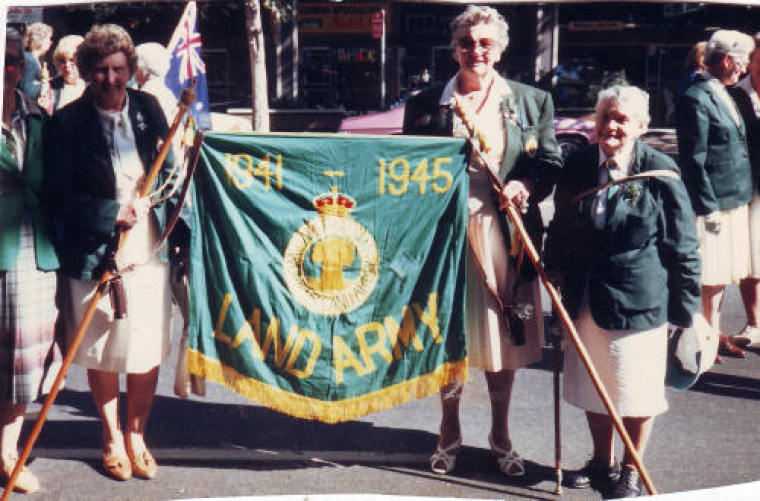
Howden noted that as mining cuts swathes across the countryside, it is the Country Women's Association who are doing the marching on the streets of Sydney to demand a fair share for farmers.
Moreover, ot was noted that men are on the land in greater numbers, the proportion of women has doubled since the mid-1960s, when they accounted for just 15 per cent of agriculture workers. (www.smh.com.au)
All this reminded Well-Being Australia chairman Mark Tronson of his farming grand-mother who moved in 1911 upon her marriage to his grand-father to the Tewantin farm (near Noosa, Queensland's Sunshine Coast) and his own mother upon her marriage in 1947 to his father to their diary farm at Crediton (near Eungella, 60 miles west of Mackay, Queensland on the Great Dividing Range..
Jesse Tronson bore five children who all went to school on horse back from the Tewantin farm (Seymour his father was born in 1917), and Joan Tronson bore three children, with Mark being born in 1951 where Seymour with the other farming men of the district built Crediton Hall which doubled as the school.
Reading the history of these two women illustrated the nature of farming life for the many families of that era who "lived off the land" for their income and raised their families in rural situations.
In 1934 Jesse and Walter sold the Tewantin farm to their eldest Viva and her husband Cyril and relocated to Long Island on the Whitsundays where they established the Island as a tourist resort naming it "Happy Bay". Jesse Tronson was renown for her cooking and many a tourist returned for their holidays.
Joan Tronson
Her daughter-in-law Joan Tronson migrated from England as a 13 year old in 1933 and with friends joined the Land Army for WWII's duration working in Tumit and Batlow on the orchards. After the war Seymour Tronson was taking a working holiday which included Batlow where he met Joan and they married Easter 1947 whereupon she found herself a farmer's wife in north Queensland.
Her diary of those early years is recorded in the Tronson family history on-line at
Several extracts illustrate the nature of farm life of the era, the late 1940's and early 1950's:
16 September 1948
Well the scrub is finished for this year, just over fifty acres, are we glad to see it down, telephone came along our road without any trouble now. Boys worked from nine am to half past six pm. Victor Lomas, Eric Chebman & Seymour. Vic came for dinner again. They cut two trees down, 6,000 ft of timber we stand to make 4 pound out of it, royalty money. Seymour has worked on scrub since end of March, as had one month off June, and July while I was having Kim.
13 November 1948
Very very dry, milk production very low, drought well and truly on, Indigo Jones predicts it will extend till Nov 1949, will be terrible of it does, and as a rule he is correct so what the future holds God alone knows. Water holding out so far and cattle not too thin as yet not much hope for a buyer if this continues. We have faith in our Heavenly Father and in each other.
26 November 1948
It looks today if drought is to continue for some months yet all cloud and no rain old saying goes means drought for sure and today is dryer than ever a drying wind. It is so depressing this continual dry makes me lie worrying at night. Our paddocks have no grass. Seymour says he will chop trees and how I hate him having to do that and if he was killed. No rain, no money, no relief, only tears are water.
7 December 1948
Today it rained and rained we just had a wonderful storm, what a simply marvelous feeling to see the rain again. Seymour was working on the new fence a cloud formed the same as yesterday above our house. We didn't think it would come to anything and Seymour went off to his work, well I had just put nappies out and first one drop fell and then another, then it just came down in torrents, line blew up in lounge, poured in windows but did I care, no. I just fell on my knees and thanked God my heart was filled with gratitude, Seymour raced home on Blossom (horse) singing with excitement and he yelled as he came up the stairs, my darling was so happy and he didn't know just how the strain of months of worry was over us both, knelt and thanked our Saviour. We farmers on plateau received most of the rain.
Are these the sentiments of farming families today, 64 years hence. You better believe it!
Dr Mark Tronson is a Baptist minister (retired) who served as the Australian cricket team chaplain for 17 years (2000 ret) and established Life After Cricket in 2001. He was recognised by the Olympic Ministry Medal in 2009 presented by Carl Lewis Olympian of the Century. He has written 24 books, and enjoys writing. He is married to Delma, with four adult children and grand-children.
Mark Tronson's archive of articles can be viewed at www.pressserviceinternational.org/mark-tronson.html
